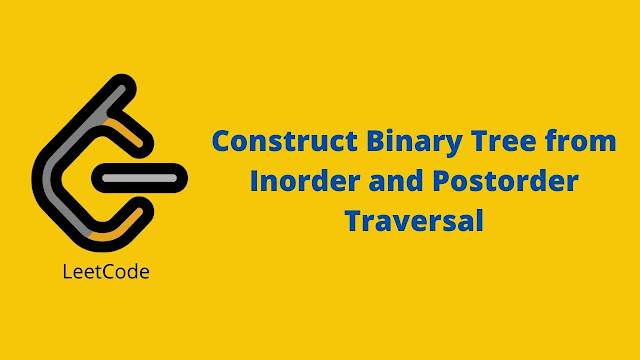In this Leetcode Construct Binary Tree from Inorder and Postorder Traversal problem solution we have Given two integer arrays in order and postorder where inorder is the inorder traversal of a binary tree and postorder is the postorder traversal of the same tree, construct and return the binary tree.
Problem solution in Python.
class Solution:
def buildTree(self, inorder: List[int], postorder: List[int]) -> TreeNode:
in_map = {}
for i in range(len(inorder)):
in_map[inorder[i]] = i
def func(inorder, postorder, start, end, in_map):
if start >= end:
if inorder == [] or start > end:
return None
if self.pindex >=0:
node = postorder[self.pindex]
self.pindex -= 1
return TreeNode(inorder[start])
else:
if self.pindex >=0:
node = postorder[self.pindex]
self.pindex -= 1
root = TreeNode(node)
idx = in_map[node]
root.right = func(inorder, postorder, idx + 1, end, in_map)
root.left = func(inorder, postorder,start, idx - 1, in_map)
return root
self.pindex = len(postorder) - 1
return func(inorder, postorder, 0, len(inorder) - 1, in_map)
Problem solution in Java.
class Solution {
public TreeNode buildTree(int[] inorder, int[] postorder) {
return helper(inorder,0,inorder.length-1,postorder,0,postorder.length-1);
}
public TreeNode helper(int []inorder,int si,int ei,int[] postorder,int ps,int pe){
if(si>ei)
return null;
TreeNode root=new TreeNode(postorder[pe]);
int idx=si;
while(idx<inorder.length && inorder[idx]!=postorder[pe])
idx++;
int count=idx-si;
root.left=helper(inorder,si,idx-1,postorder,ps,ps+count-1);
root.right=helper(inorder,idx+1,ei,postorder,ps+count,pe-1);
return root;
}
}
Problem solution in C++.
class Solution {
public:
TreeNode* buildTree(vector<int>& in, vector<int>& post) {
unordered_map<int, int> pos;
int n = post.size();
for (int i = 0; i < n; i++) {
pos[in[i]] = i;
}
TreeNode* root = NULL;
for (int i = n - 1; i >= 0; i--) {
int num = post[i], p = pos[num];
//cout << num << ":" << p << endl;
TreeNode* tr = new TreeNode(num);
if (i == n - 1) {
root = tr;
continue;
}
TreeNode* node = root, *prev = NULL;
while (node) {
prev = node;
if (pos[node->val] > p) node = node->left;
else node = node->right;
}
node = tr;
if (pos[prev->val] > p) prev->left = tr;
else prev->right = tr;
}
return root;
}
};
Problem solution in C.
struct TreeNode* buildTree(int* inorder, int inlen, int* postorder, int postlen){
if(inlen == 0) return NULL;
struct TreeNode* curr = malloc(sizeof(struct TreeNode));
curr->val = postorder[postlen-1];
int mid = 0;
while(inorder[mid]!=curr->val) ++mid;
curr->left = buildTree(&inorder[0], mid, &postorder[0], mid);
curr->right = buildTree(&inorder[mid+1], inlen-mid-1, &postorder[mid], inlen-mid-1);
return curr;
}







0 Comments